The Dell XPS 13 7390 2-in-1 Review: The Ice Lake Cometh
by Brett Howse on November 15, 2019 11:30 AM ESTDisplay Analysis
Dell offers two display options. The review unit arrived with the first option: a 1920x1200 sRGB display, offering pen and touch support. Dell also offers a 3840x2400 P3-D65 panel, which delivers a higher resolution image with a wider color gamut, but as we've seen time and time again, will come with a stiff hit to battery life. Both feature bonded Corning Gorilla Glass 5 as well, for added durability. In addition, the displays feature a good anti-reflective coating, which is rated at 0.65% reflectivity. This means more viewing of what’s on the display, and less viewing of what’s in the room.
The move back to a taller screen provides a lot of benefits in the laptop space, where doing work often involves the vertical axis. Scrolling spreadsheets or webpages are two basic examples of an added benefit of more vertical pixels, and while it may not seem like a big change to go from 16:9 like most laptops to 16:10, in use it is a very welcome change. It also eliminates the large chin found on the bottom of most laptop displays, and Dell has stretched out the 13.3-inch on the outgoing XPS 13 to a slightly larger 13.4 in the same footprint, without increasing the size of the laptop itself.
The base display offers 169 pixels-per-inch (PPI) pixel density, which, while still well above the standard 92 PPI of old, doesn’t match the Surface Laptop 3, as an example. But it still offers plenty of resolution for most tasks, and with the added benefit of offering better battery life. But if you do want lots of PPI the 4K option will of course double the PPI to 338, at the cost of money and battery life.
Dell also offers Dolby Vision on both panels, but Dolby Vision on laptops is not what you may think. It will support Dolby Vision video playback in Netflix, but it doesn’t transform the display into an HDR offering. It just works to provide the best picture it can with the hardware available. On the 4K panel though, Dell is offering P3-D65 gamut support as well as HDR 400 certification. It should be a fantastic display in certain scenarios, but be warned that Windows is fairly hamstrung on support for HDR, and especially wide-gamut displays, since its color management is fairly limited.
To see how the display performed, we tested it with Portrait Display’s SpectraCal software with a custom workflow. Brightness and contrast were measured with the X-Rite i1Display Pro colorimeter, and color accuracy was tested with the X-Rite i1Pro2 spectrophotometer.
Brightness and Contrast
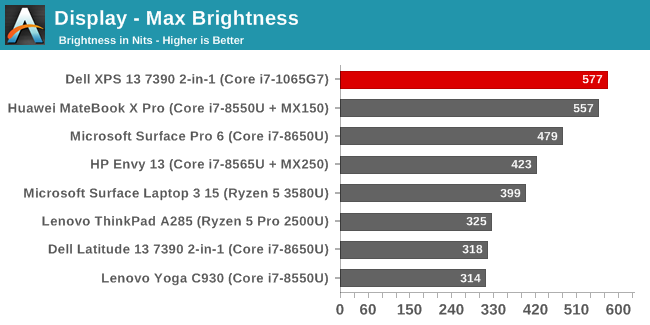
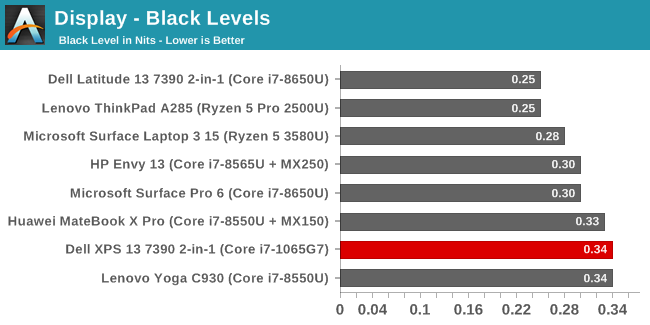
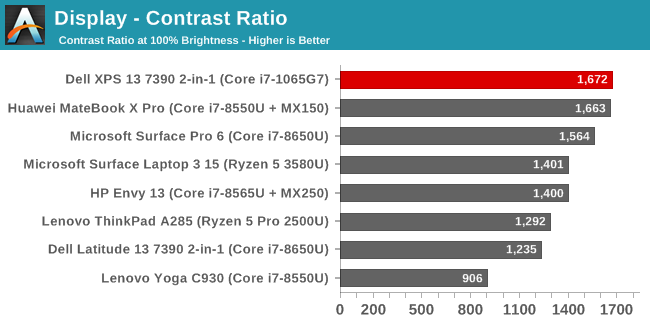
The XPS 13 can get exceptionally bright, closing in on 600 nits, while at the same time offering almost 1700:1 contrast ratio. These are fantastic results for a laptop, and especially one that is this portable since it should work well even under bright conditions. If it had a downside, it would be that the display only dims to 27 nits (white), which is far too bright to use as a tablet in bed.
Grayscale
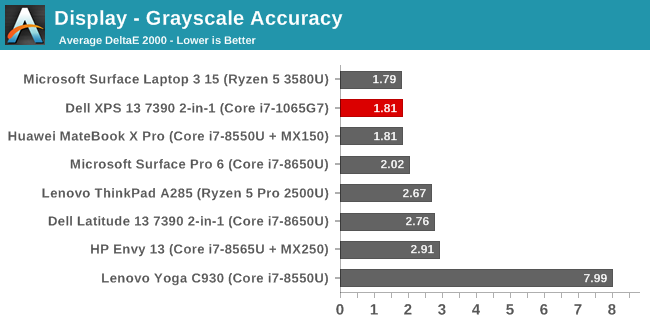
Dell has upped their game significantly with the XPS 13 7390. Clearly they’ve employed some color calibration, since the display’s grayscale accuracy is almost perfect, with no error levels over 3.0, and a gamma that closely matches the 2.2 target. The display is slightly cool in its white point, but overall it is a great result.
Gamut
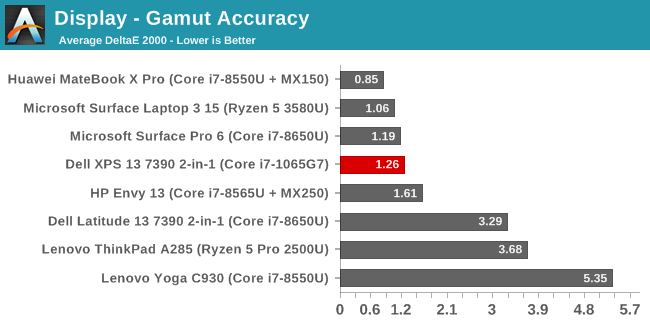
Testing the display at 100% levels for the primary and secondary colors shows that Dell has taken their color seriously on this laptop. It pretty much perfectly matches the sRGB color gamut, with great accuracy on all of the colors. All of the results are well under the 3.0 level we consider to be accurate, and most are under the 1.0 level we’d consider imperceptible.
Saturation
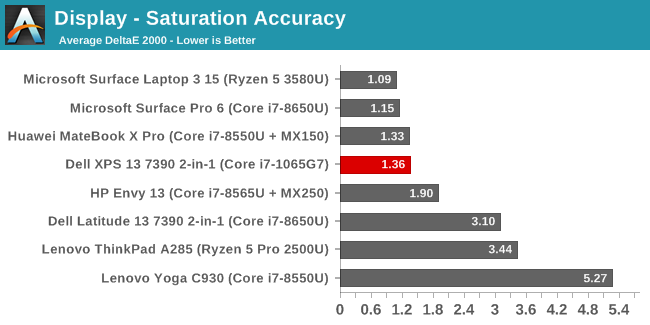
The saturation sweeps run all of the primary and secondary colors in 4-bit steps from 0% to 100% brightness. The results are nearly perfect, and well under the 3.0 level across the entire range on all six colors.
Gretag Macbeth
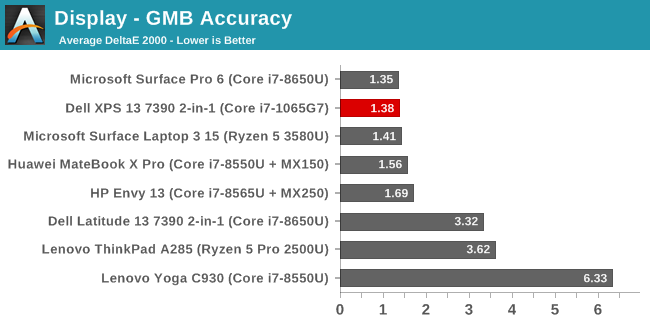
Our final test is the Gretag Macbeth, with tests a variety of colors outside of the primary and secondary axis, and including the important skin tones. None of the tested color points were really even over the 2.0 error level. This is a great result.
Colorchecker
This shows the relative error level with the target color on the bottom, and the displayed color on the top. Overall the results are near-perfect.
Display Conclusion
The XPS 13 offers one of the best displays on any notebook we’ve tested. The move back to the taller 16:10 aspect ratio is most welcome, and it’s been refreshing to see some manufacturers utilize taller displays such as the 3:2 and 16:10 when it used to be almost impossible to find anything that was not 16:9. The aspect is even more important when you consider this is a convertible laptop, and 16:9 does not work very well as a tablet.
Dell also offers an excellent anti-reflective coating, which will hopefully spur on their competitors to follow suit. This is something Apple’s iPad range has excelled at for some time, but many PCs still have either a matte coating to scatter the light, which also reduces the sharpness of the image, or very reflective glass coatings which are sharp but hard to use outside. The XPS 13 7390 offers both a very bright, and a low reflectivity coating, meaning it should excel in bright environments.
Finally, Dell has calibrated the display, meaning the colors on the XPS 13 are almost perfect.
This combination is a big win for the XPS 13, and provides it yet another area where it excels over its competition.


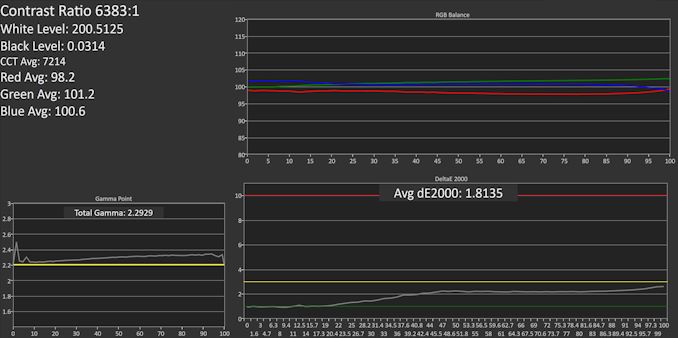
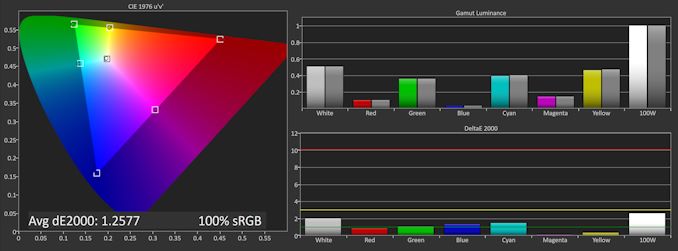
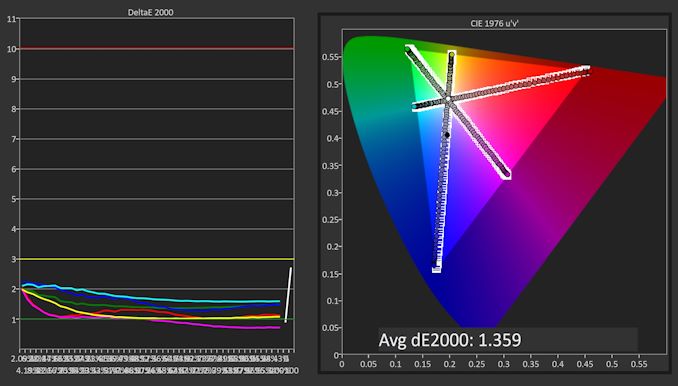
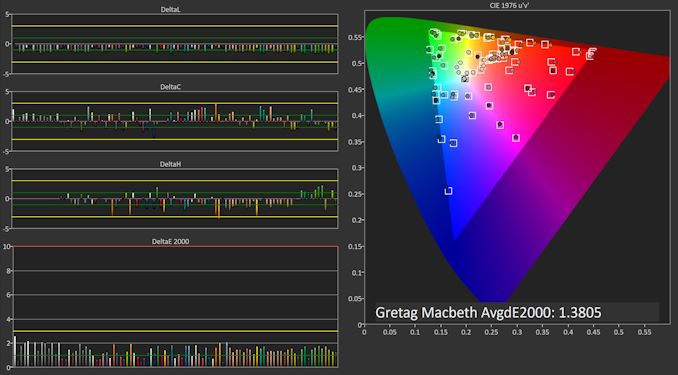









108 Comments
View All Comments
Alistair - Saturday, November 16, 2019 - link
Funny true story. Our CEO got the old XPS and the wifi never worked. Got one of the sysadmins to look at it and he couldn't fix it and got fired. Unfortunately no one asked me first thing I do is replace with Intel modules and no problem.timecop1818 - Saturday, November 16, 2019 - link
These have been soldered in for the last 2 or so generations of XPS.Alistair - Saturday, November 16, 2019 - link
oh really? I was referring to an XPS 15 in which it is removable, didn't know they soldered for the XPS 13 (which is a bad laptop honestly).villageboy - Saturday, November 16, 2019 - link
Stylus?AntonErtl - Saturday, November 16, 2019 - link
I found the first paragraph revolting. The XPS13 never showed up in my laptop market reviews, so it certainly did not redefine the laptop landscape for me. Things I look for these days (and how this XPS13 fares):A4 size (not wider than the keyboard): check
non-glare display: check
HDMI: fail
VGA: fail
Several USB-A ports (for mice and USB sticks): fail
replaceable battery: probably fail (the review does not say; it should)
buttons for the mousepad: fail
1920x1200: check
So I stick with my 2013-vintage Lenovo E130, which satisfies all the requirements except 1920x1200; and it cost only EUR 400 (plus the cost of replacing the HDD with an SSD).
Eris_Floralia - Saturday, November 16, 2019 - link
On 4/8GB LPDDR4X models, the configuration should be Dual channel 32bit right? So it only provides half the bandwidth of the 16GB model which is quad channel 32bitBut the iGPU only has 32EU so probably not a big problem
IntelUser2000 - Sunday, November 17, 2019 - link
You can also get the i7 with 8GB RAM. Anandtech isn't showing all the configurations.And not necessarily, if the manufacturer wishes they can get 128-bit width out of the 4GB chips. That's what Apple did with the iPad.
isthisavailable - Saturday, November 16, 2019 - link
The i3 and i5 are the verions with "G1" GPUs so basically, this is a $1500 laptop. Also, no USB Type-A, no buy.yetanotherhuman - Saturday, November 16, 2019 - link
This is probably closer to the perfect laptop than any laptop has been before, but it absolutely just needs at least one USB Type A port. I'm just not carrying dongles around for every tiny basic device that I come across.yankeeDDL - Saturday, November 16, 2019 - link
I've starting to look for a replacement of my ageing AMD A10, and this looks quite good.This said, today 4C/8T is the bare minimum, and 512GB of SSD too, so I am looking at>
i7 / 16GB / 512GB - $1699.99+
Seems a bit steep, to be honest. The Dell Latitude 7400 series offers similar characteristics for less than 1500< I suppose it is heavier though. Still, it seems a bit pricey...